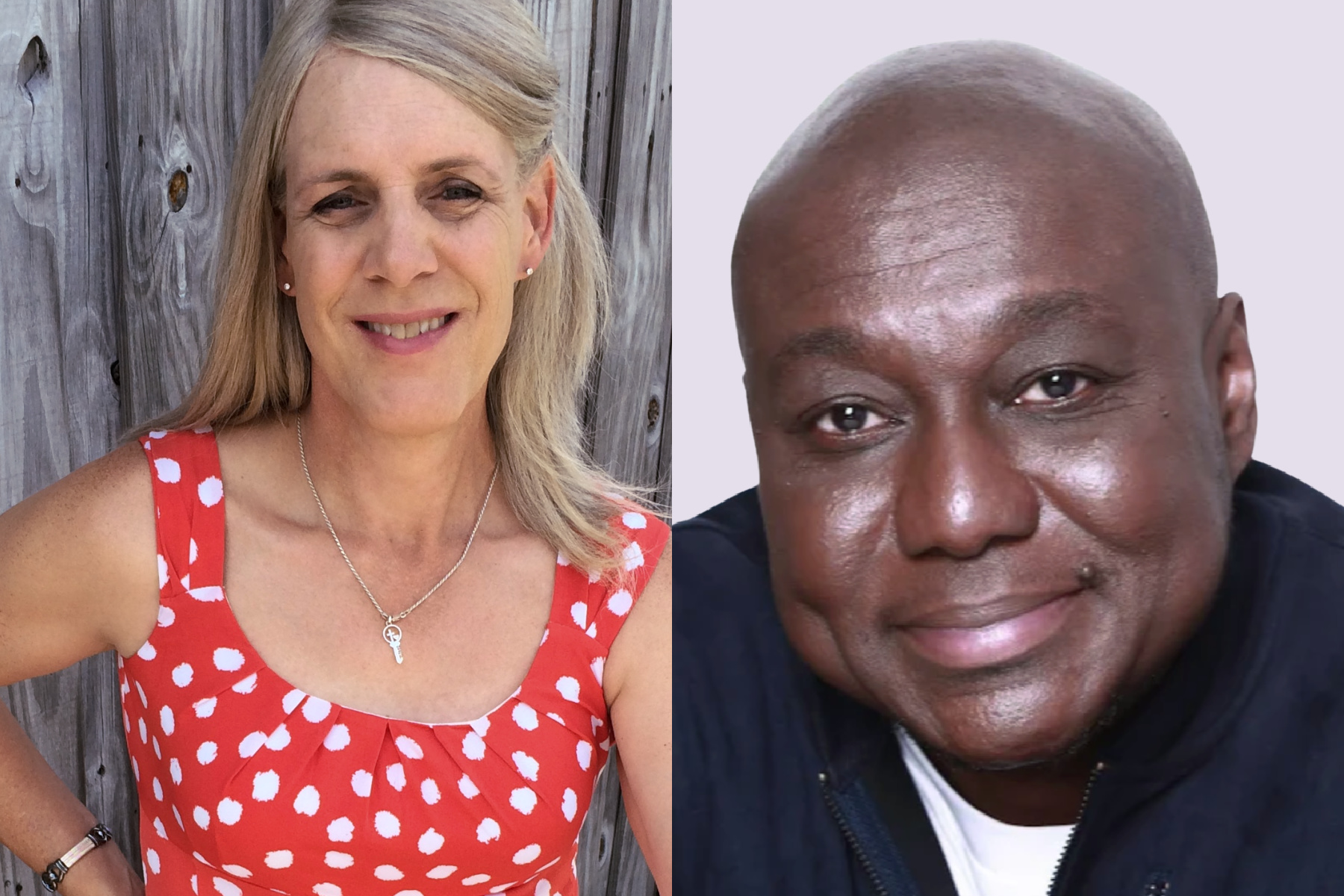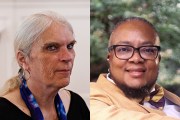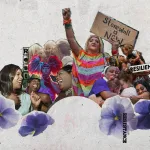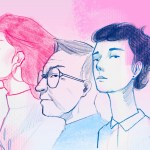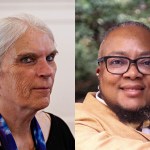What do you want to know about caregiving, aging and disability? We want to hear from you, our readers, about what we should be reporting and how we can serve you. Get in touch here.
Media coverage of transgender people is often focused on youth. While younger generations are far more likely to identify as LGBTQ+, transgender older adults exist and have always existed.
It is difficult to know how many transgender older adults there are right now, according to Kylie Madhav, senior director of diversity, equity and inclusion at SAGE, the largest national nonprofit representing the interests of LGBTQ+ older adults.
“That’s not information captured by the U.S. Census. But we estimate that by 2050, there will be 7 million LGBTQ+ people who are 50 and older,” Madhav told The 19th.
Pride Month: Resistance, resilience, recreation and rest
This story is part of our Pride Month coverage. From lived experiences to in-depth Q&As and survey data, we’re focused on telling stories highlighting themes that reflect the complexity of emotions elicited by this moment in time. Explore our work.
The 19th selected four themes to guide our Pride Month coverage this year: resistance, resilience, recreation and rest. The 19th spoke with four transgender older adults about their stories and what these themes mean to them.
In this first part, Randi Robertson discusses resistance as a transgender veteran and lifelong member of the Seventh Day Adventist Church. She is joined by Criss Smith, who discussed how resilience shaped his journey from Jamaica to Wall Street to teaching high school students.
These interviews have been edited for length and clarity.
Randi Robertson, she/her, 60
- Indialantic, Florida, aka the Space Coast, where “we shoot rockets off once a week”
- Occupation: Instructor pilot for JetBlue airlines
On Resistance
Sara Luterman: Tell me a little bit about your story. Where were you born? What was it like for you growing up?
Randi Robertson: I was born in Tallahassee, Florida. My father was at Florida State working on his Ph.D. in music. He was a professor of music, and that’s what he did his entire professional life.
I grew up in Collegedale, Tennessee, where my father taught at what’s now Southern Adventist University. So I grew up in a tiny little town just outside of Chattanooga, the home of Little Debbie.
It was a very conservative southern, Seventh Day Adventist community. Fairly fundamentalist. My life revolved around church and church community. I have three siblings. I had wonderful parents, lots of wonderful family friends that I grew up knowing. I had good adult leaders and mentors and all of those things.
I knew from a very early age [that I was transgender]. Somewhere between the age of 6 and 9, I clearly understood that I had a different sense of myself than most of my playmates. I spent much of my life growing up, even past college, sorting through all of that and trying to reconcile who I perceived myself to be with what my place of heritage said I should be.
After I finished high school, I went to Seventh Day Adventist University in southwest Michigan, where I completed a bachelor’s degree in aviation. That’s where I met my wife. We just celebrated our 39th anniversary a few days ago.
Oh, congratulations!
Thank you. I did all of those things. It’s a fairly common narrative for trans people of my age and generation. We married as soon as I finished school and started life together. We waited several years for children. I went into the aviation industry for a short period of time but it didn’t work out really well. I got a second bachelor’s degree and went into long-term health care for a few years.
Then I joined the Air Force. I stayed in the Air Force for a full career – 22 and a half years. I retired in December of 2010. But throughout that entire time, I continued to struggle. I kept doing the things I was supposed to. We had our first child [in] 1992 and our second one in 1994. We also ended up raising a nephew, due to family circumstances.
-
Read Next:
Once I resolved my internal issues and came to my own understanding of things, religious and so on, and so forth, I came to realize who I was — the reality of who I was. I had to make a choice. And I chose to stay engaged with my family to the best of my ability and continue to provide. I didn’t upset the applecart until very late in my career. My wife knew for a long time. During the last several years of my Air Force career, she came into the closet with me.
After I retired, I started the journey of coming out. I have been out to my wife for 12 years now. It’s been about eight years since the whole world has seen me as who I am.
The reality is, I’ve had a very good life. I’ve been successful by all standards. And I’ve had the last eight-ish years to start seeing maybe some of the darker sides of culture and humanity. When you go from the position of ultimate privilege in a society – if I’m seen as a cisgender, White woman professional, you know, I lose a couple of notches, right? If I’m seen as a trans woman, I drop very close to the bottom. It’s really stark when you encounter that. It certainly has helped craft my worldview over the last handful of years, without a doubt.
Do you currently belong to a church?
Yeah, I do. I’m a member at Whole Life Church in Orlando, Florida. Whomever you may be, wherever you may find yourself in a slice of humanity, people are welcome at our church. But for church political purposes, it’s quiet. It’s quietly affirming.
What does “resistance” mean to you?
I spent 20 years in the military. Service has always been a theme in my life. Resistance is a kind of service: resisting evil, resisting oppression. Resisting marginalization is a service to the broader community – not just the trans community or the LGBTQ community, but the larger community as a whole. When we allow those elements to creep in, we all collectively become less.
Resistance, speaking up in the right places at the right times to the right people, when given the opportunity, is service. Fighting online serves no purpose, honestly. So I don’t engage in that. But I do engage in thoughtful conversation when I’m provided the opportunity.
What political issues are you most concerned about right now? Things are pretty intense in Florida currently.
There are several levels of concern for me. One of the levels of concern is does the state become too hostile? Do I end up in a place without access to necessary health care, without access to health care which is going to treat me well?
If my freedoms, my wife’s freedoms become restricted, then we have to look for friendlier places to live. Honestly, our little community here along the beach has never had any problem whatsoever. That said, Brevard County is one of the most conservative counties in the entire state of Florida. How people treat me is different than what the law is.
If the state is going to make me have an M on my driver’s license instead of an F, if the state makes it hard for me to obtain the medications that I use on an ongoing basis, because I’m a trans person, that’s a threat. It feels like [state government’s] underlying theme is writing transgender people out of society. Not just transgender people – the entire LGBTQ community.
We’re lucky. We have the financial resources to move if things get that bad. My heart aches for the young people who are living in this state who realize that they’re LGBTQ. That’s why I speak up. That’s why I’m doing this interview today. People need to realize we’re here — whether politicians in Tallahassee or any other capital say we exist or not, we’ve always existed. We will always exist.
I spent 22 and a half years in the Air Force defending the Constitution for everybody. And now they want to say I’m not human.
What are some of the ways that resistance is present in your life right now?
First, it’s me being me. It’s me showing up at my workplace, fully myself. It’s being unashamed of who I am. It’s me participating in the community via the normal political methods, voting, speaking up. Contacting legislators, even though it’s pointless here in the state of Florida, for the most part right now. What we need is for everybody who’s remotely an ally to start speaking up. That’s how we start to turn the tide. Resistance is participating. Resistance is being here. We have to stand up. We have to say that this is not what the Constitution is about. [People who oppose trans rights are] trying to distort something powerful and beautiful – not even distort it. They’re trying to throw it out.
What is some wisdom you’ve gained that you’d like to share with younger people, especially younger trans people?
The willingness to live your truth is huge. Not living your truth — even if you stay alive, breathing, it kills you. You’ve got to live your truth, even when it’s hard, even when it’s not. Because it’s better than living a lie.
I don’t hurt anybody, by being who I am. In fact, I make a whole lot of people a whole lot better by being who I am. Is it a struggle? Heck, yeah. But it’s worth the struggle.
Is there anything I didn’t ask about that you think is important for people to know?
We used to always say, “It gets better.” It’s a nice little flip phrase. But it gets better not because we sit and wait for it to get better. It gets better because we work at it, not just as individuals, but as communities. Not just as a marginal community, but as the community at large. It gets better because we invest in and work to make it get better.
Criss Smith, he/him, 63
- New York City
- Occupation: Retired from Wall Street after 30 years and working as a part-time high-school substitute teacher
On Resilience
Sara Luterman: Being a substitute teacher seems like a big change from Wall Street.
Criss Smith: It’s completely different. My friends and I who worked in finance for many years, we always end up doing something a little bit more philanthropic after retiring. This friend of mine once said that we’re actually cleansing our souls after making so much money.
Tell me about your life. Where were you born? What was it like for you growing up?
I was born in the Caribbean, on the island of Jamaica. My family immigrated to the United States when I was 10 years old. I grew up in Brooklyn, went to high school there and so forth.
My family is very religious. We didn’t just have church on Sunday. There was Bible study and all these other church services during the week as well. I grew up in a strict household.
It was very strict. When I was in high school, I was a very quiet and very polite person. As a matter of fact, one of my counselors once wrote on my report card, “very smart student, but does she speak?” I was always very quiet in school and very shy. I always knew that I was different, but didn’t know in what direction to take that.
-
More Pride Month coverage
- ‘When do we get to shine?’ Black trans men discuss leadership, self-love and showing up for themselves
- Lesbian bars have endured — with community, grit and a little reinvention
- Allyship, the emotional challenge of LGBTQ+ coverage — and why it will cost $5 to wish us happy Pride
It wasn’t until I got an academic scholarship to Skidmore College [in] upstate New York and started going to school there that I started to really open up.
One of my classmates – I remember we were hanging out and she reached over and kissed me on the lips and she said, “Do you like this?” and I thought, “OK, it’s not bad.” So I started out as a lesbian in college.
I came back home and didn’t say much to my family about my sexuality, because there was always the quote unquote “church guilt,” like the Lord is going to strike you dead. So I kept it to myself.
It wasn’t until a few years later, when I actually had a lover, a woman that I fell in love with. I introduced her to my family as my girlfriend. My siblings were very supportive. But my mom did not speak to me for a whole year. She just completely didn’t want anything to do with it. But I just kept on going.
After that, I started my career on Wall Street and became very successful there. I was a vice president at Citibank, worked in global finance. I worked at Merrill Lynch. I worked at JPMorgan Chase in asset management. I identified as a lesbian at that point.
When did you realize you were transgender?
That came later. When I first started [on] Wall Street, I was not out at all about anything. I started working on Wall Street in the 80s. This was the time where women only wore skirts and dresses. Pants were not a thing for women. It was a very chauvinistic environment, very male driven. Years later, when I was at JPMorgan Chase, I came out as a lesbian. I think it was the 2000s.
Did coming out make your job difficult?
Yeah. The majority of people were not very supportive. But some people were. JPMorgan prides themselves on being very forward thinking in terms of LGBT issues. One year in June, during Pride Month, the CEO actually had breakfast with the LGBT club at the corporation and watched presentations we did. I got to go have conversations with him. Some of the other senior leaders encouraged us. They said that they wanted 100 percent of us to show up for work. Because if you’re not out, you’re not giving 100 percent.
Even though I didn’t always find support at work, in my private life, I was very active in the community. Every time there was a march or tea dance or something, I was always there.
What political issues are you most concerned about right now?
I am more concerned about the backlash that’s being thrown at the trans community. That is my biggest worry. It seems like we’re being blamed for the high price of eggs. Right now, everything that goes wrong, it’s because of trans [people]. It seems to be a hot ticket item for politicians to harm us right now. All of a sudden, there’s 142 laws written at the state level against trans [people] and transition as a process. I find that very, very scary.
But I am very hopeful because I teach high school, with young people at the age where they’re beginning to find themselves. I am so hopeful. The type of resilience that I see teenagers have now — I wish I had an ounce of that when I was their age. They are so willing and able to speak out and say, “No, this is me.” That has given me a lot of hope. It fills me with joy every day.
What does the word resilience mean to you?
Resilience means not giving up, regardless of what’s being thrown at you. You just never stop. You never give up. And I think that I’ve always demonstrated that in my life.
I’ve experienced some horrible things throughout the years. I’ve worked with men who yell at their secretary, saying, “I am already married to a bitch. Why do I have to come to work and deal with one?” This was during a time when this sort of thing was very common in the corporate environment. Of course, someone would get fired for saying that today, but the era I worked in, it was prevalent.
What wisdom do you feel like you’ve gained that you’d want to share with younger people, particularly younger trans people?
The most important thing is to be patient. Because even though [young people] give me so much hope, I think that some of them need to just be patient, because they want it yesterday. Even though I wanted to yesterday, I took my time. I transitioned seven years ago.
Be patient. It gets better, even though it might not look that way right now. Your life is going to be so much better and so much more rewarding. That body dysphoria that you’re experiencing right now — try not to let it take over everything in your life. Make sure that you have your education and that you’re able to be self-sufficient. Don’t make any quick decisions that will put you in a position where you cannot take care of yourself.
Do you see a lot of trans students when you’re substituting?
Yes. I actually have several students that are trans right now. But I don’t tell them that I’m trans. All they see is Mr. Smith. I am very supportive of them.
How does it feel to see these young people figuring themselves out?
It is somewhat scary, but it’s enlightening. They are so determined. And they are so willing to stand up and step forward. I was this very shy and timid young person, they are just the opposite.
They make me proud every day. There’s nothing to argue about. They show up authentically as themselves. They show up as I wish I could have when I was their age.
Is there anything I didn’t ask about that you think is important for people to know?
I feel that people my age have been in the forefront of this battle and have fought, physically fought for young people to not have to physically fight anymore, to just show up just as you are. We have paved that way. We have taken a lot of battle scars in order for them to walk down the street with your head held high and be proud.
